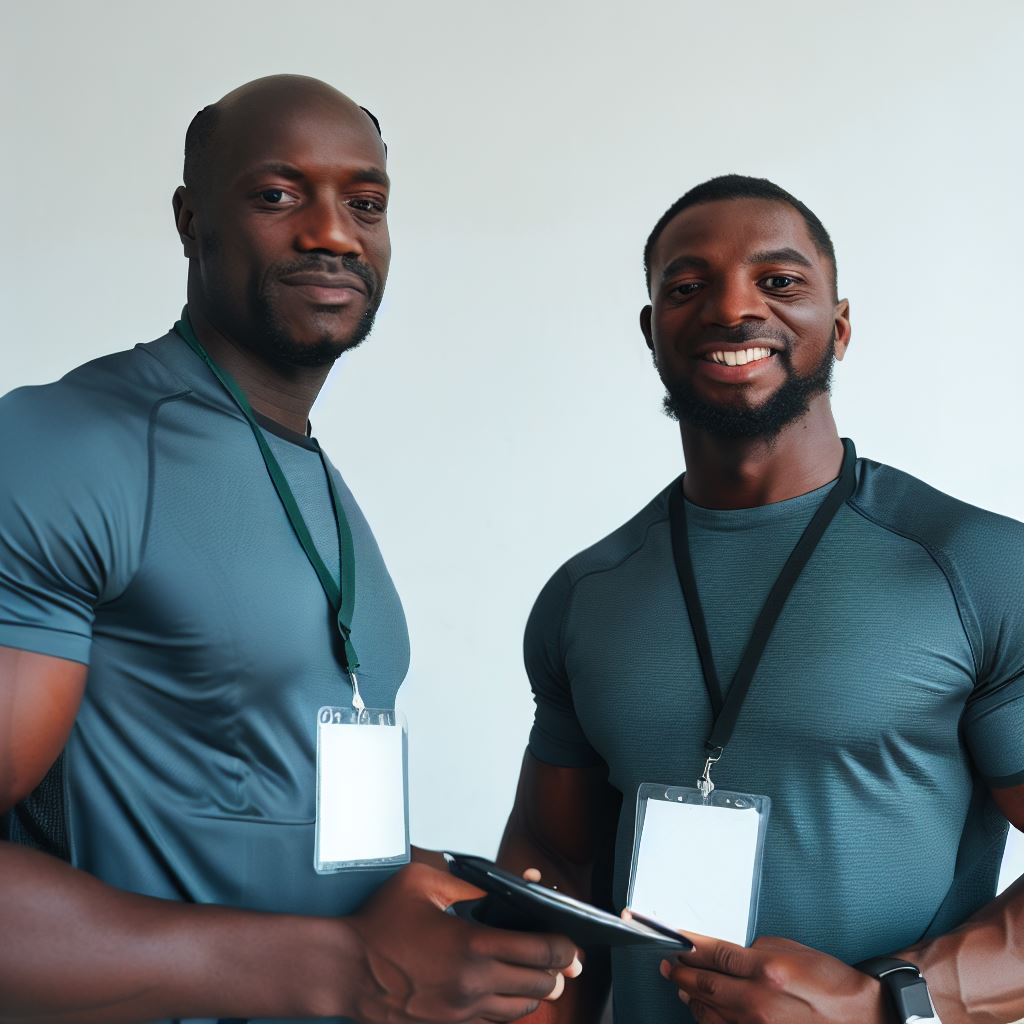Introduction
The role of Sports Information Directors (SIDs) in Nigeria
Sports Information Directors (SIDs) in Nigeria play a crucial role in the sports industry. They are responsible for managing and disseminating information related to sports events and athletes.
SIDs act as a bridge between athletes, coaches, fans, and the media, ensuring that accurate and timely information is shared.
- SIDs are unsung heroes.
- Vital in sports organizations.
- Bridge between teams and media.
- Manage information flow.
- Enhance sports coverage.
- Promote athletes and events.
- Maintain team records.
- Overcome challenges they face.
Definition and Responsibilities of Sports Information Directors in Nigeria
What a SID is and their primary role in providing information
Sports Information Directors (SIDs) play a crucial role in providing information to the public and media about sports events and teams in Nigeria.
They are responsible for managing the flow of information and ensuring that accurate and timely updates are disseminated.
The specific responsibilities of SIDs in Nigeria
- Managing Media Relations: SIDs act as a liaison between sports teams, athletes, and the media.
- Content Creation: SIDs are responsible for creating engaging content related to sports events and teams.
- Event Coverage: SIDs coordinate and oversee media coverage of sports events. They arrange press conferences, interviews, and media passes for journalists.
- Social Media Management: SIDs maintain and update social media accounts for sports teams. They strategically publish content, engage with fans, and respond to queries or comments.
- Statistical Analysis: SIDs compile and analyze sports statistics to provide accurate data to the media and public. They keep track of player performances, team records, and historical data.
- Crisis Management: In the event of controversies or issues related to sports events or teams, SIDs must handle crisis situations effectively.
- Press Box Operations: SIDs oversee the press box during sporting events.
- Media Training: SIDs provide media training to athletes and coaches.
- Website Management: SIDs maintain and update sports team websites. They ensure that the website design is user-friendly and that all relevant information is readily accessible.
- Photography and Videography: SIDs may be responsible for capturing photos and videos of sports events and teams.
- Branding and Marketing: SIDs work closely with marketing teams to enhance the public image of sports teams.
- Press Releases and Media Alerts: SIDs draft and distribute press releases and media alerts to inform the media about upcoming sports events, team announcements, or important updates.
- Broadcasting Partnerships: SIDs establish relationships with broadcasting outlets to ensure that sports events receive proper coverage.
Sports Information Directors in Nigeria play a crucial role in providing accurate and timely information about sports events and teams to the public and media.
Their responsibilities range from managing media relations to content creation, event coverage, and social media management.
Lack of resources and infrastructure
Challenges Faced by Sports Information Directors in Nigeria
In Nigeria, Sports Information Directors (SIDs) encounter numerous challenges due to the lack of resources and outdated infrastructure.
These obstacles severely impact their ability to effectively communicate and disseminate information to the public. Let us discuss some of the challenges faced by SIDs in Nigeria
Issues like the lack of proper equipment, outdated technology, and inadequate funding
1. Limited Resources
- Insufficient funding restricts SIDs from acquiring necessary resources for their work.
- Without proper financial support, they struggle to provide up-to-date information and updates.
- Limited resources also hinder their ability to conduct timely research and produce accurate statistics.
2. Outdated Equipment
- Many SIDs in Nigeria face the challenge of using outdated and inadequate equipment.
- Old cameras, printers, and computers limit their capacity to capture and produce high-quality content.
- Inefficient equipment negatively affects their ability to provide timely updates and engage the public.
3. Inadequate Technology
- The lack of access to modern technology impedes SIDs’ ability to stay connected and engage with their audience.
- Slow internet speeds and unreliable connectivity hinder their efforts to share real-time updates.
- Outdated systems and software make it difficult for SIDs to manage databases efficiently and produce professional reports.
4. Insufficient Funding
- Due to inadequate funding, SIDs often struggle to organize media events and press conferences.
- They are unable to allocate budgets for promotional campaigns and marketing strategies.
- Insufficient funding also limits their ability to hire qualified staff, resulting in increased workload and decreased productivity.
5. Limited Training Opportunities
- SIDs in Nigeria face challenges regarding inadequate training and professional development opportunities.
- The lack of specialised courses and workshops deprives them of valuable skills and knowledge.
- Limited training opportunities hinder their ability to adapt to evolving communication techniques and emerging trends.
6. Inefficient Communication Channels
- Outdated infrastructure affects the availability and reliability of communication channels.
- Slow or unreliable internet, poor phone networks, and limited media access impede effective information dissemination.
- SIDs are unable to reach a wider audience and fail to promote sporting events effectively.
7. Lack of Collaboration
- Limited collaboration between SIDs and other stakeholders, such as sports federations, hampers their work.
- The absence of partnerships hinders access to exclusive information and restricts the flow of timely updates.
- Limited collaboration also affects their ability to build extensive networks and engage with the sporting community.
8. Inadequate Support Systems
- SIDs often lack proper support systems and personnel assistance in managing their workload.
- The absence of dedicated staff members and administrative support affects their efficiency and productivity.
- Inadequate support systems limit their ability to focus on strategic planning and proactive communication.
Sports Information Directors in Nigeria face significant challenges due to limited resources and outdated infrastructure.
The lack of proper equipment, outdated technology, inadequate funding, and limited training opportunities hinder their effectiveness in communication and information dissemination.
Moreover, inefficient communication channels, a lack of collaboration, and inadequate support systems further amplify these challenges.
Relevant authorities and stakeholders must prioritize empowering SIDs by offering resources and support to enhance sports communication in Nigeria.
Read: A Day in the Life of a Nigerian Sports Information Director
Language and cultural barriers
The challenges posed by Nigeria’s diverse cultural and linguistic landscape
- Nigeria’s diverse cultural and linguistic landscape poses challenges for Sports Information Directors (SIDs).
- SIDs must understand and adapt to multiple languages, dialects, and cultural norms.
- Effective communication requires SIDs to be sensitive to cultural differences and customs.
- Language barriers can hinder the dissemination of sports information accurately and efficiently.
- Navigating diverse cultural norms requires SIDs to tailor their strategies for different audiences.
- SIDs must develop a deep understanding of the local language and cultural nuances.
- Translating sports information into different languages is crucial for reaching diverse audiences.
- SIDs need to be aware of cultural customs, traditions, and sensitivities when communicating sports news.
How SIDs must navigate multiple languages, dialects, and cultural norms to ensure effective communication
- Cultural diversity should be celebrated and embraced to enhance effective communication for SIDs.
- Collaboration with local language experts can help SIDs overcome language and cultural barriers.
- SIDs face the challenge of communicating effectively in a country with over 500 local languages and dialects.
- A deep understanding of the cultural context is necessary to ensure clear communication.
- SIDs must select the appropriate language or dialect to reach specific target audiences.
- Adopting a localized approach helps SIDs tailor their communications to regional preferences.
- Interpreters can assist SIDs in bridging the language gap during interviews and press conferences.
- Cultural norms dictate the acceptable ways of conveying information and interacting with different audiences.
- SIDs must adapt their communication styles to match the cultural norms of their target audience.
- Respecting cultural differences and being open to learning can help SIDs connect with diverse communities.
- Understanding the cultural significance of sports in Nigeria is essential for effective engagement.
- Building strong relationships with local communities helps SIDs navigate cultural barriers successfully.
The challenges faced by Sports Information Directors in Nigeria should not be underestimated.
The country’s diverse cultural and linguistic landscape demands SIDs to be adaptable and sensitive in their communication.
Navigating multiple languages, dialects, and cultural norms can be overwhelming, but with the right strategies and collaboration, SIDs can overcome these barriers.
Celebrating cultural diversity and respecting local customs are key to building effective communication channels.
By understanding the local language and cultural nuances, SIDs can ensure their sports information reaches diverse audiences accurately and efficiently.
Embracing the challenges and opportunities presented by Nigeria’s unique cultural and linguistic diversity is the path to successful communication for SIDs in the sports industry.
Read: Salary Insights: Sports Information Directors in Nigeria

Accessibility to information
The difficulties SIDs face in accessing accurate and timely information
- Sports Information Directors (SIDs) in Nigeria face challenges accessing accurate and timely information.
- They struggle to obtain match results, player statistics, and team updates.
- Reasons for the unavailability of information include poor data collection.
- Lack of coordination between sports associations also contributes to the problem.
- Limited media coverage further hampers the SIDs’ access to relevant information.
Potential reasons for the unavailability of information, such as poor data collection
- Poor Data Collection: Inadequate data collection processes can lead to a scarcity of information.
Sports organizations may lack the resources or expertise needed to gather and maintain comprehensive data, resulting in gaps in statistics, player profiles, and historical records. - Lack of Coordination Between Sports Associations: When different sports associations and governing bodies operate independently, it can lead to fragmented information.
- Limited Media Coverage: Sports events that receive limited media coverage often suffer from a lack of visibility.
- Financial Constraints: The cost of data collection, storage, and dissemination can be a significant barrier.
- Technological Gaps: In regions or countries where technological infrastructure is underdeveloped, accessing and disseminating sports information becomes challenging.
- Language and Cultural Barriers: Information may be scarce due to language and cultural differences.
- Bureaucratic Hurdles: Administrative red tape within sports organizations can slow down the collection and distribution of information.
Complex approval processes and hierarchies may delay the release of data to the public. - Data Privacy Concerns: Concerns about data privacy and athlete consent can restrict the availability of certain types of information, such as athlete health records or personal details.
- Lack of Incentives: In some cases, there may be little incentive for sports organizations to invest in comprehensive information management.
If there is limited public interest or financial gain from sharing information, it may not be a priority.
Addressing these issues requires collaboration among sports associations, investment in technology and infrastructure, improved coordination, and a commitment to transparency and open data principles.
By overcoming these hurdles, the sports industry can enhance information availability and accessibility for fans, researchers, and stakeholders alike.
Read: How to Become a Sports Information Director in Nigeria
Limited media coverage
Sports Information Directors (SIDs) in Nigeria face various challenges due to limited media coverage for sports events in the country.
These challenges can significantly impact the promotion and dissemination of sports information to the public.
In this blog section, we will discuss the obstacles SIDs encounter and explore the reasons behind the low media interest in sports events in Nigeria.
Challenges faced by SIDs
- Limited exposure: SIDs lack opportunities to showcase a variety of sports due to limited media coverage.
- Football dominance: The dominance of football in Nigeria hinders media interest in other sports, limiting coverage opportunities for SIDs.
- Insufficient investment: Sports journalism receives insufficient investment, which affects the coverage of sporting events and hampers SIDs’ efforts.
- Lack of resources: SIDs struggle with limited resources to effectively promote and publicize sports events.
- Technological limitations: Inadequate access to modern technology and digital platforms impedes SIDs’ ability to reach a wider audience.
- Language barriers: Communication challenges, particularly language barriers, hinder effective interaction with both local and international media.
- Low public interest: Limited media coverage leads to low public interest, making it difficult for SIDs to engage and educate sports enthusiasts.
- Reporting bias: Existing media bias towards certain sports influences the coverage decisions, leaving lesser-known sports with minimal exposure.
Reasons behind low media interest
- Lack of financial incentives: Media outlets prioritize sports that generate higher revenue or sponsorships, resulting in limited coverage for sports events with lower financial opportunities.
- Overdependence on football: The overwhelming popularity of football in Nigeria leads media organizations to focus primarily on it, overlooking other sports.
- Negative perception of non-football sports: Some media outlets and the public view non-football sports as less significant, reducing their coverage.
- Inconsistent sporting success: Nigeria’s inconsistent performance in certain sports may lead to decreased media interest and coverage.
- Limited knowledge and education: Lack of awareness and understanding about lesser-known sports can contribute to low media interest.
- Infrastructure challenges: Insufficient sporting infrastructure and facilities affect the organization and attractiveness of many sports events.
- Inadequate marketing strategies: Poor promotion and marketing of sports events lead to low media interest and coverage.
Sports information directors in Nigeria face numerous challenges due to limited media coverage.
Factors such as football dominance, insufficient investment in sports journalism, and lack of exposure to a variety of sports contribute to low media interest.
SIDs strive to overcome these challenges by finding innovative ways to promote sports events, improving communication, and advocating for increased media coverage.
It is crucial for stakeholders to recognise the importance of diverse sports and invest in comprehensive media coverage to enhance the development and growth of sports in Nigeria.
Read: Top Universities for Sports Information Studies in Nigeria
Solutions and Recommendations
Propose possible solutions for SIDs to overcome these challenges
- Improve infrastructure: Invest in modern facilities and equipment to enhance the collection and dissemination of sports information.
- Invest in technology and training: Provide SIDs with the necessary tools and knowledge to effectively gather, analyze, and distribute sports information.
- Establish effective communication channels: Create platforms for SIDs to interact with athletes, coaches, and sports associations to gather accurate and up-to-date information.
- Advocate for increased funding and support: Sports associations and government entities should allocate more resources to empower SIDs and enable them to perform their duties effectively.
- Promote collaboration between SIDs, media outlets, and sports associations: Cooperation is essential to improve the overall sports information landscape, ensuring accurate and timely dissemination of information.
- Encourage the development of specialized training programs for SIDs: Offer workshops and courses specifically designed to equip SIDs with the necessary skills and knowledge.
- Establish an accreditation system for SIDs: Implement a standardised process to evaluate and recognise qualified SIDs, enhancing professionalism within the field.
- Create mentorship programs: Experienced SIDs can mentor and guide young professionals, transferring their knowledge and expertise to the next generation.
- Expand networking opportunities: Organize conferences and seminars where SIDs can exchange ideas, share best practices, and build professional relationships.
- Utilize social media and digital platforms: Embrace technological advancements to reach a wider audience and engage with sports enthusiasts seamlessly.
Conclusion
The crucial role of SIDs in Nigeria and the need for sustainable solutions to address the challenges they face
Sports Information Directors in Nigeria face various challenges in their role. However, by implementing the recommended solutions, these obstacles can be overcome.
Improving infrastructure, investing in technology and training, establishing effective communication channels, and advocating for increased funding and support are crucial steps.
Collaboration between SIDs, media outlets, and sports associations is essential to enhancing the overall sports information landscape.
sWith the right support and resources, SIDs can excel in their role and contribute to the development of Nigerian sports.
Sports Information Directors (SIDs) in Nigeria play a crucial role in the sports industry.
They face various challenges, including limited resources, lack of recognition, inadequate technology, and poor infrastructure.
These obstacles hinder their ability to effectively promote and manage sports in the country.
However, with sustainable solutions such as increased government support, funding, and investment in infrastructure and technology, these challenges can be addressed.
SIDs are vital in creating awareness, generating revenue, and fostering the development of sports in Nigeria.
Their expertise and dedication should be acknowledged and supported to ensure a thriving sports industry in the country.




